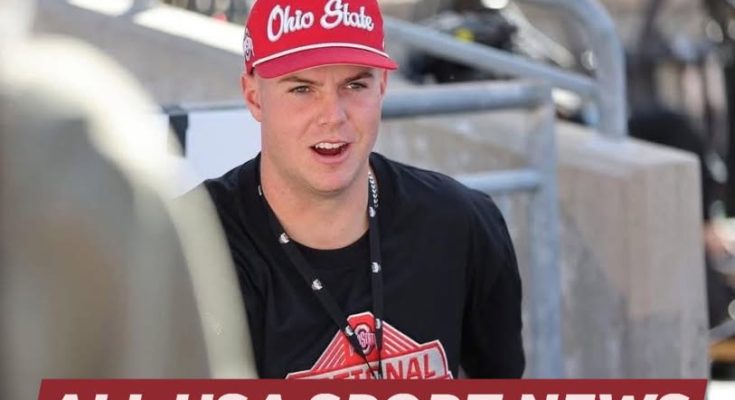Will Howard’s journey from Kansas State to Ohio State was more than just a change of jerseys—it was a leap that reshaped his life, his career, and his identity. He hasn’t merely described it as difficult—he’s insisted that nothing prepared him for just how tough it would be. “For me, I think a bigger difference in speed was going from K‑State to Ohio State,” he admitted during an appearance on the Downs 2 Business podcast, stating bluntly: “That jump from Ohio State to here, I don’t think was as drastic, honestly, as that jump from K‑State to Ohio State. Because really, if you look at it, we were playing against NFL guys every single day. Our defense last year, I think, had 12, 13, maybe 14 NFL dudes all on one team.
Imagine being a multi-year starter at Kansas State—accumulating over 5,700 passing yards, nearly 50 touchdowns, and leading your team to a Big 12 championship—only to step into an environment so elevated in intensity that the game feels like playing against professionals, even in practice. That’s precisely the challenge Howard confronted. At K‑State he was seasoned and confident; at Ohio State, he was suddenly the rookie again, navigating a new playbook, elevated scrutiny, and teammates whose talent levels mirrored those of NFL rosters. He didn’t sugarcoat it—this transition demanded his all.
Yet Will Howard embraced that grind. He didn’t run from the pressure; he welcomed it. At a postgame interview reflecting on his transfer and its impact, his emotion was raw. He choked up, voice thick with gratitude: “I have no words, man. They’ve changed my life in more ways than I can say. Coach Day and these guys here have completely, completely changed my life. I can’t believe God gave me the chance to be a Buckeye. There’s nothing like it.” (SI) That moment—where tears meet triumph—embodied how profound the journey had been.
Howard’s decision to transfer wasn’t made lightly. He’d contemplated entering the NFL Draft; he had a Senior Bowl invite and conversations with scouts. But the collective feedback was clear: scouts wanted more film, more growth. Still, choosing Ohio State over the professional route wasn’t just about stats—it was about development, opportunity, and legacy. He explained that he came to Coach Ryan Day seeking to become a better player and win a national championship. That was his ultimate motivation.
Looking back on what prepared him for that leap, he credited the Yaz, Kelly, Fessler, Larkin—Ohio State’s coaching staff—for pushing him harder than he’d ever been before. “I’ve never been coached this hard. I knew I was going to get coached hard, and that’s what I needed. I needed that.” He said he owed so much to Coach Day, calling him “probably the best coach I’ve ever been around.”) It was fierce molding, not coddling—exactly what he needed to make that jump stick.
On another layer, Will’s faith and support system held him steady amid the chaos. His roots, grounded by his family—his parents Bob and Maureen—provided the calm and reinforcement he leaned on. Even when he was stepping into the most pressure-packed environment of his college career, he drew strength from the sense of stability his family had filled, and the knowledge that this move was more professional than personal: “When I went out to Kansas State as an 18‑year‑old kid… [Ohio State] was different. I’m older now. It felt more like a professional kind of move, [but] my family did an unbelievable job of helping me.”
Internally, Howard’s mindset mirrored his journey. “Nothing that is worth getting ever comes easy,” he told reporters, reflecting on his time at Kansas State setting the groundwork—hardened by ups and downs, championship moments and losing streaks alike. But when he walked into Ohio State, he understood this opportunity was too good to pass up. He also acknowledged the inevitable pressure and expectations: stepping into Columbus meant stepping into the pressure cooker of Big Ten and national title expectations.
And yet, though the speed, pressure, and intensity were overwhelming, Howard turned that challenge into fuel. He embraced Ohio State’s culture. Rather than demanding immediate buy-in, he took a nuanced approach: “I wanted to get to know everyone first and come in and not be trying to lead everyone and bark orders right from the get‑go, man,” he later reflected. He wanted to understand what being a Buckeye meant before leading it.
That humility, combined with his adaptability, paid off on the field. He went from feeling physically outpaced in practice to performing at a level no one expected. He threw for more than 4,000 yards, 35 touchdowns, and was instrumental in Ohio State’s postseason run—ending in a national championship. He put the team on his back at the end, delivering a critical 56‑yard pass when it mattered most.
It’s no wonder fans and analysts took notice. One fan wrote, “I like the fact that when Will Howard was asked if he had any regrets, he said his only regret was that he wished he had more time at Ohio State. He genuinely loved being a Buckeye.” (Reddit) Another observed, “It’s amazing how much of a Buckeye Howard is… Dude heard all the shit talk about him, Kansas State even wanted him gone. But we wanted him and he is here to prove shit.” These voices underscore the slam of impact he made in such a brief tenure.
When the dust settled and NFL prospects came calling, Howard reflected on the transfer decision with finality: “Coming to Ohio State was the best decision I ever made. I’m more prepared now than ever, thanks to the development, playing against our defense… Everything here is great.”
Will Howard’s path to becoming a Buckeye wasn’t a smooth handoff—it was a survival fight, an identity reboot, and a resurrection of his value as a quarterback. He went from being a veteran leader at Kansas State to wrestling with speed, expectations, and saturation of elite talent at Ohio State. But through faith, humility, hard coaching, and relentless insistence—on himself and his preparation—he shattered ceilings, delivered on the highest stage, and reaffirmed that nothing worth having ever comes easy.


